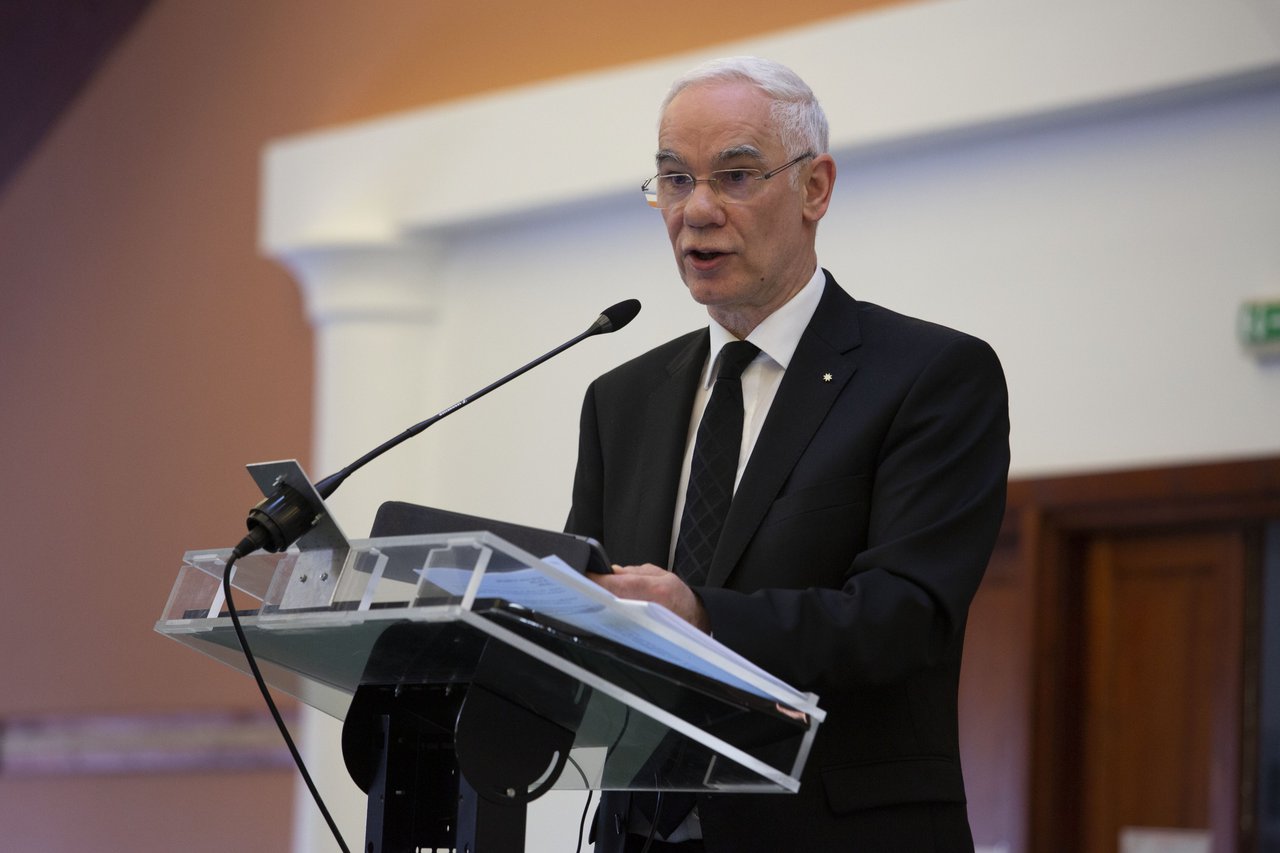Bishop Zoltán Balog, Ministerial President of the Synod, in his opening address at the two-day session of the General Synod of RCH spoke about the solidarity with Transcarpathia, Ukraine, the role of religious education and the need for fairness. Korean Presbyterians visited the two-day meeting.
“Practicing mercy and doing good deeds are the main tasks of the Church. And as Christian brothers and sisters, we must be fair to one another, not only at the denominational level, but also at the ecumenical level,” addressed Bishop Zoltán Balog, ministerial President of the Synod his fellow Synod members in his opening speech at the beginning of the two-day session.
He highlighted the refugee crisis in the wake of the conflict in Ukraine and the faithful ministry of the congregations of the Reformed Church in Transcarpathia among refugees as good examples of the practice of justice. “I am moved and touched by the love and support shown by the Church, and by the whole country, towards Transcarpathia and the refugees from Ukraine. In the last hundred years, there has never been an act of solidarity on a similar scale which we have witnessed in the last month," said the Bishop.
Zoltán Balog called on the congregations to continue to take responsibility for Ukraine and the Reformed community in Transcarpathia, who are doing their utmost to help those who arrive in their region from inside Ukraine. The Bishop pointed out that during the national Sunday collection on March 27, there were congregations who donated ten times their usual offering for the solidarity fund collected by RCH. Reformed congregations, individuals and companies, the Hungarian Reformed Church Aid collected more than 300 Million HUF so far for the benefit of the needy. This includes the donations offered spontaneously by international sister churches and partner organisations. He also drew attention to the Reformed congregations in the border region, who are playing a major role in welcoming refugees and delivering aid across the border.

In his opening speech, Bishop Balog also highlighted the importance of the solidarity among pastors within the Hungarian reformed communities in the region. The Reformed Church in Hungary established a Relief Pension Fund for retired reformed pastors in Ukraine already in 2008. Now, with the help of donations from Reformed pastors in Hungary, this fund will be opened to pastors in active ministry in Transcarpathia. The Presidium of the Synod has asked pastors of RCH to show solidarity with their fellow ministers in Transcarpathia, who have been living under difficult circumstances, by offering regular payments to the special fund. The Bishop stressed that since the outbreak of the war, not a single Transcarpathian pastor has left his congregation in Ukraine, even though the number of the members of congregations has significantly decreased.
In his opening address, the pastoral president said that the church was celebrating the Year of Religious Education, which showed the importance of renewing faith formation. The Bishop proposed that meetings of religious teachers be organised in all Church Districts so that they can work in community and not in isolation.
He also reported on the dialogue that had begun in the Church on the creation order. “We believe that a pastoral approach to the question is the key. For us, love must be at the forefront when we address this issue, while at the same time we must stick to our confessions. Love is not about relativizing or replacing principles, but about making them more accessible.” He mentioned that most often religious teachers have to face questions related to human sexuality, therefore the Church has to develop materials for them in pastoral care and other relevant issues.
Zoltán Balog also drew attention to the Hungarian Reformed Unity Day organised by the General Convent of Hungarian Reformed Church in the Carpathian Basin, to which believers from all Hungarian congregations are welcome. This year, the Transylvanian Reformed Church District will host the annual celebration of the fellowship of Hungarian speaking reformed churches of the reguin, on May 20-21 in Gyulafehervár (Alba Iulia), Romania.
The Bishop also reported about the construction and renovation of 66 kindergartens in the framework of the National Kindergarten Programme, enabling the Reformed Church to reach 4,000 additional children. He also spoke about the renovation of the Bethesda Hospital and the Károli Gáspár Reformed University. He stressed that this is not only a time of external renewal, but also of internal renewal, since the basic aim is to establish a living connection between the institutions and the congregations.
Zoltán Balog presented the new organisational structure of the national Church, which has been in place since 1 January. The main activities of the church have been grouped into five major service branches, including the Diaconia and Reformed Church Aid; the Mission Service, the Educational Service, the Tender and Investment Service and the Synod Office, which are responsible for the coordination the national church and its social ministries.
The Synod meeting was attended by Béla Nagy, the Chief Elder of the Reformed Church in Transcarpathia, Western Ukraine. In his address, the Lay President expressed his gratitude to RCH for the continued support for the Reformed communities and municipalities of Transcarpathia. He stressed that they have received support from almost all Hungarian congregations, as well as a lot of help and personal support from the Hungarian Reformed Church Aid, and the leadership of the Synod. He pointed out that the Reformed Church in Transcarpathia distributes and share the humanitarian aid they receive from Hungary in compliance with Ukrainian legislation, supporting also Ukrainian compatriots in Central Ukraine and refugees in the Western region of the country.
Béla Nagy had a meeting with the Korean delegation, as well, which included leaders of the Presbyterian Church of Korea and the Korean Diakonia who signed a Memorandum of Understanding with the Hungarian Reformed Church Aid to jointly support the people of the war-torn Ukraine.